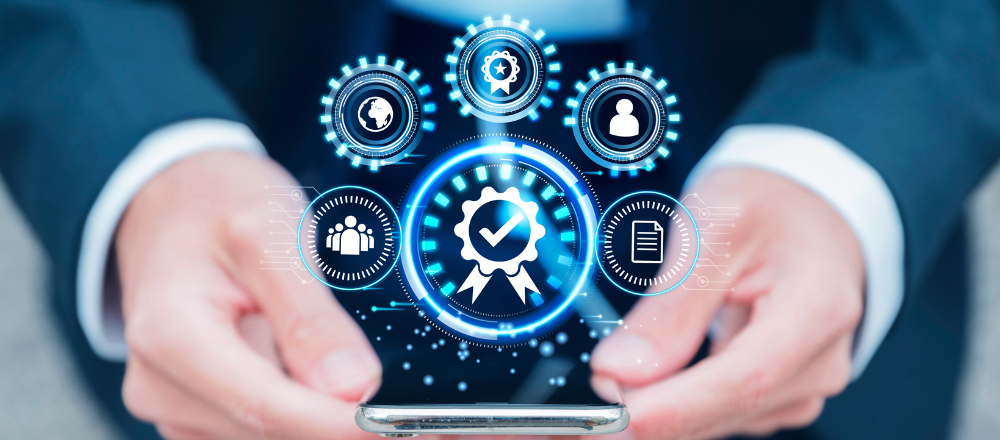Technology has always proved to be one of the most crucial parts of human life. From smartphones to electric vehicles, technology is everywhere, and we are completely dependent upon it too. Now, keeping up with the digital transformation trends comes out as a necessary thing to do.
These tech trends are used by various custom software development services to offer the best services to their clients. Keeping in mind the inclination of developers and tech enthusiasts towards new-age inventions like machine learning and artificial intelligence, we can say things are changing at a fast pace.
The future of technology looks pretty interesting, as there are multiple aspects that will be explored and modified this year. We cannot say what technological developments we will get to see in 2023. Nonetheless, here we have listed down the 10 digital transformation trends that we can get to see booming this year. These trends could play a major role in the mobile app development market along with shaping the future too.
10 Digital Transformation Trends that one should look out for
1. Security and AI paving the way
One of the most popular trends of 2023 is going to be Artificial Intelligence (AI) for solving security-related features. With the help of automation, digital transformation services providing companies will provide their clients with advanced security systems in order to keep all the valuable information safe. Artificial Intelligence (AI) delivers a system that helps in detecting threats, dealing with problems, and even aiding in making better decisions.
That said, there are multiple ways AI use cases that will help in boosting the security of an organization. Any Artificial Intelligence based system can be trained to manage and identify patterns in user behavior and unusual activity that can be dubbed a potential security threat. The same can also let businesses identify phishing attempts and fake accounts that can cause serious harm to the systems.
Talking about the figures, It is being said that Artificial Intelligence (AI) is all set to boost the global economy up to $15.7 trillion by the end of 2030. Now, this is not something surprising considering the involvement of AI in our daily life. For example, AI-based systems are used everywhere, like hospitals, government, agriculture, military, phones, and home appliances. Moreover, it is also used by top mobile app development companies to offer their clients AI-powered customer service solutions.
We can surely say that in the year 2023, we are going to see Artificial Intelligence (AI) making its way in multiple market-based advancements. However, Nothing on this planet comes without limitations, and the same is the case with AI. One of the major disadvantages of AI is that it will, and it is contributing to the eradication of multiple jobs.
According to the World Economic Forum 2020, it was claimed that AI will dissolve 85 million jobs and will create 97 million of them by the year 2025. As of now, already a majority of brands want to work on AI-based systems. The main reason behind it is that Artificial Intelligence (AI) can work 24×7 hours which is one of the biggest limitations of human resources.
2. Fast-paced digital transformation
Digital transformation has been in play even before the pandemic came into play. However, one thing which we would like to mention is that the companies were going through their digital transformation phase at a slow pace. However, right after the pandemic, as soon as organizations started the importance of digital transformation, digital transformation became more of a necessity. If we go by the example, there have been multiple firms that had no other option but to shut down their offices in compliance with the government norms.
This impacted their business on a serious scale, and some of them incurred huge losses too. Now, at the same time, there were companies that simply and quickly adopted the work from home model and relied on software like Slack, Microsoft Teams, Zoom, and a few more to manage the team and let the employees coordinate with each other. The companies that changed their working model and adopted the transformation did well from the business perspective without putting any of their employee’s life at risk.
As the stats suggest, the total number of free and paid users on Zoom was 10 million by December 2019. However, in April, just a month after the pandemic affected working, Zoom users grew to a whopping 300 million, which is almost 30 times of what it was just a quarter ago.
One thing which we can deduce from the whole scenario is that IT consulting services are going to play a major role in the acceleration of digital transformation. Speculations are that digital transformation will be witnessed in the niches like employee productivity, customer engagement, and even business resiliency.
3. Internet of Things (IoT)
There are multiple trends that are growing at an unmatchable rate in the international market, and one such thing is the Internet of Things (IoT). By the year 2019, there were already 26 billion devices deployed all around the globe. Similar to Artificial Intelligence (AI), the Internet of Things (IoT) is also making its debut in almost every field. A survey suggested that by 2023, every single person will have around 15 devices each based on the Internet of Things (IoT) principles.
It can be said that the majority of IoT devices are seen in smart homes, like smart speakers, smart refrigerators, smart vacuum cleaners, and even smart lights and switches. Internet of Things (IoT) serves as the main aspect when it comes to waste and traffic management, water distribution, and urban safety management. The concept of smart cities also uses the Internet of Things (IoT) to manage all operations.
One of the major challenges with the Internet of Things (IoT) is security. For example, all the devices that are based on IoT are more prone to encounter hacks, information leaks, and data breaches. The major reason behind the same is that a majority of IoT devices lack high-end security features.
Speculations regarding IoT are that all the digital transformation agencies that will offer their clients IoT-based services will also focus on tightening the security systems so that the customer is not supposed to suffer any kind of data breach or leak while relying on services based on Internet of Things (IoT). It will be interesting to see how the clients adapt to the IoT tech and what new services the tech will infiltrate this year.
4. Industry Cloud Platforms
Another major tech trend that is going to own in the year 2023 is the industry cloud platform. Businesses can head to the industry cloud platform for the management of workloads in a highly efficient way without breaking a sweat. In simple terms, industry cloud platforms are an amalgamation of SaaS (Software as a service), PaaS (Platform as a Service), and IaaS (Infrastructure as a service) coupled with customized industry-specific technological developments.
This can be dubbed a decent opportunity so that the organizations can adapt to different situations in a better way. One of the most important benefits of industry cloud platforms is that they minimize the costs incurred by a business for workload management and eradicate the need to hire additional staff for the same.
Another major leverage that the businesses get is that the industry cloud platforms enhance the quality of products and services as they provide a clear insight into performance so that the businesses can make timely adjustments. Not only this, but the same allows your business to build highly innovative solutions and test new ideas in a speedy and efficient way.
Apart from that, cloud-based operations have also given birth to a multi-cloud architecture. This simply means distributing workloads and software in an organization using one or maybe a couple of public or private clouds. The multi-cloud architecture can be deemed beneficial in terms of data residency requirements, disaster recovery, and resilience. A survey claims that in 2023, the usage of the cloud on a global level will increase by 7 to 8 percent.
5. 5G network to take over the world
The transition from 3G to 4G networking was rapid, and it changed the world and the way we perceive the internet, forever. Now, the world is ready for the next big step, which is the transition from 4G to 5G networking, and telecom providers have already tightened their belts for the same. A few regions globally have already witnessed the way 5G will work.
The fifth generation of networking is all set to offer amazing transmission speed; it is more than a hundred times the speed the predecessor network offers. As of now, the 5G networking is in its testing phase, and it is already offering speed in GBps. On paper, networking technology is going to outclass any broadband network used in a home. It is safe to say that the network will revolutionize the way top mobile app development companies work, and it will also enhance the delivery of digital transformation services.
One of the most important leverages that 5G will provide is that it will help the gadgets based on Internet of Things (IoT) seamlessly interconnect at a fast pace. A survey regarding 5G suggests that the network will cover around 40 percent of the world by the end of 2024. It has also been claimed by the telcos that the 5G network will be able to support more than a million devices per square mile.
Some of the best features that we will get to see when 5G gets deployed globally are that it will help in powering industries like transport, supply chain, and healthcare with the high-speed implementation of techs like virtual reality, augmented reality, Artificial Intelligence, Machine Learning and much more to mention. We can say that the businesses will be supposed to invest a decent amount in the development of 5G network-based infrastructure to leverage the network.
6. Metaverse
If we are talking about the emerging trends based on digitalization, we cannot leave Metaverse aside. Going by the definition, the Metaverse is a virtual world created by multiple interconnected virtual spaces, including different avatars and even objects, for one of a kind immersive experience. If the stats are to be considered, the Metaverse market will grow and clock around $800 billion in 2025, and expectations are that it will reach $2.5 trillion by the time we reach 2023.
Also Read:- How Augmented Reality and Virtual Reality App Development will Help Workers in the Metaverse
As for the use cases of Metaverse, it can serve various industries like education, healthcare, businesses, entertainment, etc. Furthermore, we have already seen the implementation of Metaverse in organizing virtual live concerts, fashion shows, and even workspaces. The increasing use of Metaverse will also change how we use the internet. For example, Metaverse is not different from the internet; it is just an evolved part of the internet which allows you to step into a virtual world and feel the stuff you want to access in a better way.
Not only this, but the Metaverse is going to modify gaming too. As of now, the Metaverse is already being combined with games that run on the internet, like Fortnite, Minecraft, and Second Life. The mentioned games provide immersive virtual and social experiences in which players from different physical locations can take part collectively. Some of the major organizations that have already started building products around Metaverse are Meta (formerly Facebook), Microsoft, Nike, NVIDIA corp., Epic Games, etc.
For your information, medical learning brands are also using virtual reality and the concept of Metaverse to make a difference in the industry. The same allows to have a simulation of patient and surgical interactions and allows medical students to practice the latest techniques.
7. Chatbots for basic conversations
Undoubtedly, there are multiple ways in which a chatbot helps us in our day to day life. For example, whenever a product gets delayed by Amazon, the first conversation we have is with a chatbot. These tools are gaining a lot of popularity, and we are expecting to see them deployed in more fields. Companies that provide digital transformation services tend to offer chatbots the applications that they develop for their client so that the end user can get quick results.
The use of chatbots is directly proportional to the growth of Machine Learning (ML), and all small-scale and large-scale businesses are adopting the same. Chatbots are basically an integration of ML and natural language processing (NLP) that offers a highly responsive, intelligent, and human conversation. Most of us will see that chatbots are used in the customer service department at a considerable level.
It is safe to say that chatbot technology has already acquired mature status in technology. However, there is still a lot of scope for improvement, making it more efficient. Currently, chatbots are highly AI-driven, and they even chat with customers as virtual customer representatives. The adoption rate of chatbots by different businesses is growing at a high speed.
Chatbots help solve the customers’ basic queries in most cases, which removes the requirement of a human agent, and they help the company in saving big time. Multiple stats related to chatbots show that around 69 percent of consumers prefer chatbots for getting instant replies.
Out of that, around 41 percent of consumers have to say that they get a better experience with chatbots. This shows already how chatbots are helpful for both businesses and customers. In the future, we can expect modifications in the chatbot tech that will make it sound more human-like and result in higher use of the same in the customer service industry.
8. Virtual Reality and Augmented Reality
Virtual Reality can be dubbed the most mind-boggling trend that is going to leave a serious impact in 2023. Virtual Reality stimulates the vision and hearing of the users, and it makes them feel the environment simulation in a way that they think is real. Virtual Reality is highly prominent in the gaming industry, led by innovations like Facebook’s Oculus and PlayStation VR.
The best part about virtual reality is that it is not limited to games only, but it can also be seen in other entertainment and edutainment niches. Some of the major theme parks all around the world offer VR-based immersive experiences. On the other hand, the same technology can be used for creating virtual museums, discovery centers, theaters, and galleries to provide edutainment solutions.
Virtual Reality also plays a major part in the training and simulation used in fields like aviation and surgery. The US government used solutions like VirtualShip and others to train the US Army, Navy, and Coast Guard. In 2023, speculations are that we will get to see a refined implementation of Virtual Reality (VR), and it may also make its way into new industries for all the good reasons.
Coming to Augmented Reality (AR), it can be said to provide a real life view through digital imagery. Augmented Reality (AR) is heavily used by applications that require camera sensors to work. The images produced by Augmented Reality (AR) get integrated into reality in such a way that it gets difficult to differentiate between the two. Applications like Snapchat and Pokemon Go are examples of ideal Augmented Reality (AR) integration.
As of now, multiple applications like IKEA and others are also using the concept of Augmented Reality (AR) to let customers get an idea of how good they will look at their homes. To do the same, users just need to open the filter of the particular product and scan the area where they want to keep it. AR is also used when it comes to showing routes on the road in real time. Expectations are that the use cases of Augmented reality (AR) are only going to increase in the future.
9. Blockchain
Blockchain can be understood as a digital ledger that is used to save the data of the users. The most amazing part about the same is that no data saved on the blockchain can be altered, which skyrockets the security system of the same. It is used in Bitcoin to maintain a secure record of transactions without any discrepancies. Blockchain as a technology is getting a decent amount of traction in fields related to the Internet of Things (IoT).
It can also be said that blockchain will be able to fill the gap that is created with IoT, and it will make the Internet of Things more secure and efficient. One thing which we are sure of is that blockchain technology has business-disrupting qualities, and it will also play a major role in mobile app development in the future. If you are a business looking for a company that can provide blockchain development services, then make sure the company you go to is aware of the blockchain tech and will be able to implement it for your business too.
10. Quantum computers
Quantum computing is something that will have a great impact on business operations. It will be based on a computing technique that uses quantum phenomena like superposition and even quantum entanglement. It also enables the machine to perform multiple complex calculations simultaneously. No doubt, the precision and speed offered by the quantum computer cannot be matched by any other computer that exists in the market. A survey suggested that there will be more than 2.6 million quantum computers deployed globally.
A major highlight regarding quantum computers is their cost-effectiveness. It can help organizations in boosting innovation. Businesses can also develop products that are customized according to the needs of their customers. It can be said that quantum computing will provide companies with swift, smart, and highly profitable solutions. In 2023, the maximum deployment of quantum computers in different markets will surely give birth to a dozen new things, and all the tech-related tasks will be streamlined like never before.
Conclusion
Here we conclude our list of top 10 emerging tech trends that will help in boosting digitalization. Still, we can say that there must be something completely new for us in 2023, which we never expected to see in terms of technological advancements. Considering the way tech experts, researchers, and analysts are increasing globally, we can expect to see some enormous changes in the tech that is already available in the market. In these ever-changing times, always look to hire custom software developers who give IT consulting services along with all the digital transformation services you need.
Frequently Asked Questions (FAQs)
What are the top three trends of digitalization?
Now, this a tricky question because of the way all the trends are growing in terms of use cases and modification; listing out three of them is surely going to be a task. However, in our opinion, the trends that are going to see significant development this year are blockchain, Artificial Intelligence (AI), and Augmented Reality (AR).
While we will get to see the use of blockchain in integration with (Internet of Things) IoT-based gadgets, AI will also play a major role in strengthening the general security-related aspects in an organization along with the generative AI use case. On the other hand, the use of Augmented Reality could be adopted by more brands this year to enhance the customer experience and traction. Most of the digital transformation services providing companies will keep their focus on delivering the best solutions based on these three trends.
What role will 5G play in digital transformation?
Telecom giants all over the world have already started the deployment of 5G in different regions. As claimed by these companies, the network will be around 100 times faster than the 4G network. 5G is surely going to affect the digital transformation consulting offered by mobile app development companies.
The use of 5G will change how augmented reality (AR) and virtual reality (VR) are being used in the current times. It will also aid in providing seamless interconnection to the devices based on the Internet of Things (IoT). However, the complete global implementation of 5G networks is going to take at least a year and a half more.
What is digital transformation?
Digital transformation can be defined as the use of modern-age technology and digital experiences to shoot up business processes, strategies, and goals by refining the workflow and customer experiences. In order to keep up with the market and match the expectation of the customers, every business needs digital transformation solutions. The adoption of digital transformation will help businesses in improving the customer journey to a substantial scale.
In 2022, the digital information market attained a size of $731.13 billion. It is anticipated that the market will grow at a CAGR of 26.7% by the year 2030. In addition, the digital transformation will also create new business opportunities and revenue streams for the businesses, along with promoting remote communication. Besides that, digital transformation will also provide a competitive advantage to organizations by enabling them to boost product quality.












